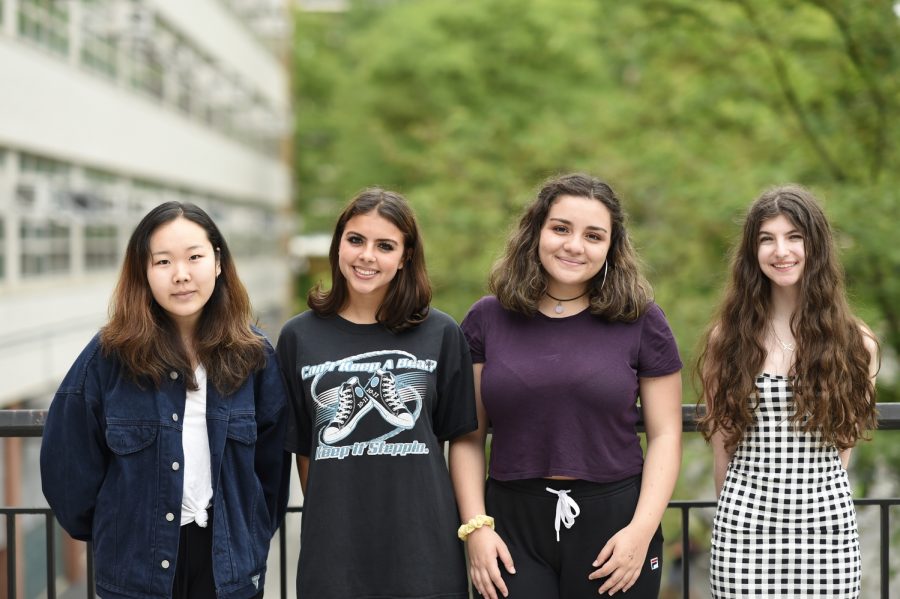Shakespearean Vibes: Our 2019 CUNY Poetry Contest Winners
Bronx Science students achieve recognition at the prestigious CUNY Poetry Contest.
(Left to right: Haley Sim, Ruby Hogue, Aline Marrero, Sylvie Koenigsberg) “This has been a really exciting and fulfilling experience for me and my creative side,” Aline Marrero ’20.
“Do you love writing poetry and are you interested in meeting a famous American poet?” If you have been keeping up with your e-mails then you’ll definitely recognize Mr. Thorp’s frequent e-mails encouraging students at Bronx Science to participate in the prestigious CUNY Poetry Contest.
The Spring Poetry Festival welcomes hundreds of original works of poetry by students from all over New York City. In this year’s 47th anniversary of the competition, four Bronx Science students had the honor of winning an award. Ruby Hogue ’20 and Haley Sim ’20 both won an Honorable Mention for their poems ‘When it Snows’ and ‘Retrograde.’ Sylvie Koenigsberg ’20 was the Second Prize winner in the entire city with ‘The Witching District’ and Aline Marrero ’20 was the World Languages award winner with her poem in Portuguese, ‘De Repente.’
The contest, previously known as New York City’s “Woodstock of the Spoken Word,” was first initiated in 1972 and has gained prestige as one of the most popular and competitive poetry competitions amongst teenagers in New York City.
Professor Pamela Laskin, the director behind the scenes, shared, “What I love most about the poetry festival is Festival day—watching all the enthused students, their parents, their teachers. I enjoy when the little ones read in the morning, and also love the sophistication and clarity of vision of the high school winners.”
Although this event has been happening for years, the topics of poetry reflect the increasing tensions of current events. “What caught my attention this year was a level of awareness of the dire political situation. Even the third graders expressed fear about our current administration. There were several poems whose focus was also grief, and this has inspired me to make my introduction about fear and grief,” said Laskin.
The poetry contest allows participants to freely explore and experiment with their own ideas. “I think the best part of the contest was that there were no guidelines as to what you had to write about. I had a lot of freedom in what I was able to write and submit, which made for a really creative and fun experience for me. I was able to write about the emotions and thoughts that I really wanted to,” shared Sim.
Morrero described winning as a feeling of “Brazilian pride” and expressed her changed perspective of the misconceptions surrounding poetry. “Now I really like poetry; I thought it was going to be boring but it ended up being a very fun way to play around with literature,” she said.
Surprisingly enough, for some of our now renowned poets, it was their first time competing. And for Morerro, a completely new encounter with writing, “I hadn’t written any poetry anymore, I wasn’t really sure of how to get started. It felt weird to put so much thought into paper. At first I was inspired by the prize money, but ended up finding inspiration in the little things. I got an idea and just went with the flow.”
On the other hand, “It sounds kind of cliché, but most of the time inspiration comes to me at random times. Most of the time they’re motivated by emotions, experiences, politics, pop culture, and sometimes music. Usually they start as random thoughts and lines that I write down in my notes app on my phone, and then later if I still like them, I will write a full poem based around them,” shared Sim.
At the end of the day we all find inspiration in different ways. “I enjoy poetry because it gives you a way to express emotions and ideas in a more abstract and oftentimes more accurate way. Sometimes emotion doesn’t translate into concrete words. I enjoy poetry and the vivid, metaphoric language it employs,” said Sim.
And although we can’t all be Shakespeare, Pam Laskin leaves you with a word of advice. “Keep on writing. Do not get discouraged. Most importantly, though, zoom in on the process of writing, enjoy the language and the form. Sometimes students get so caught up in getting the gold trophy that they forget to simply enjoy what they are doing.”
“Keep on writing. Do not get discouraged. Most importantly, though, zoom in on the process of writing, enjoy the language and the form. Sometimes students get so caught up in getting the gold trophy that they forget to simply enjoy what they are doing,” said Professor Pamela Laskin of CUNY.
Daniela Castro is an Editor-in-Chief of the ‘The Science Survey’ and a Reporter for the People Section in the Bronx Science Yearbook, ‘The Observatory.’...











